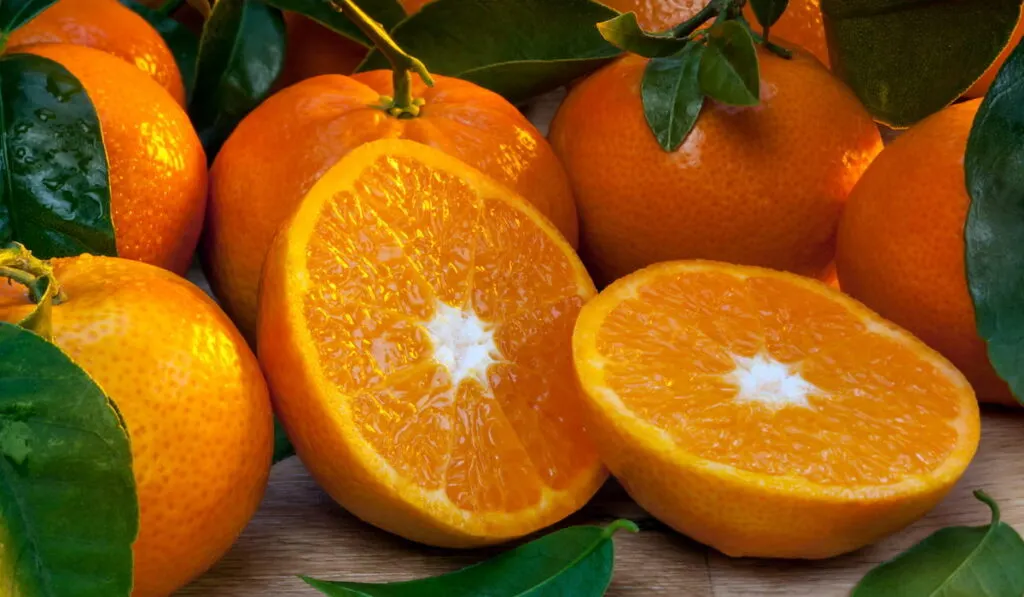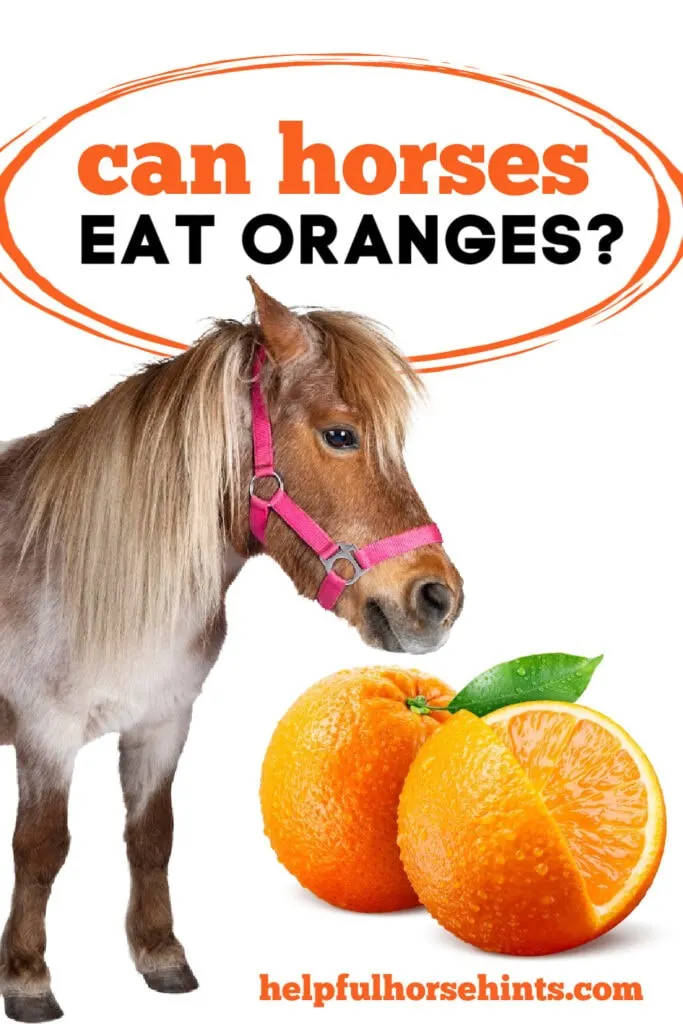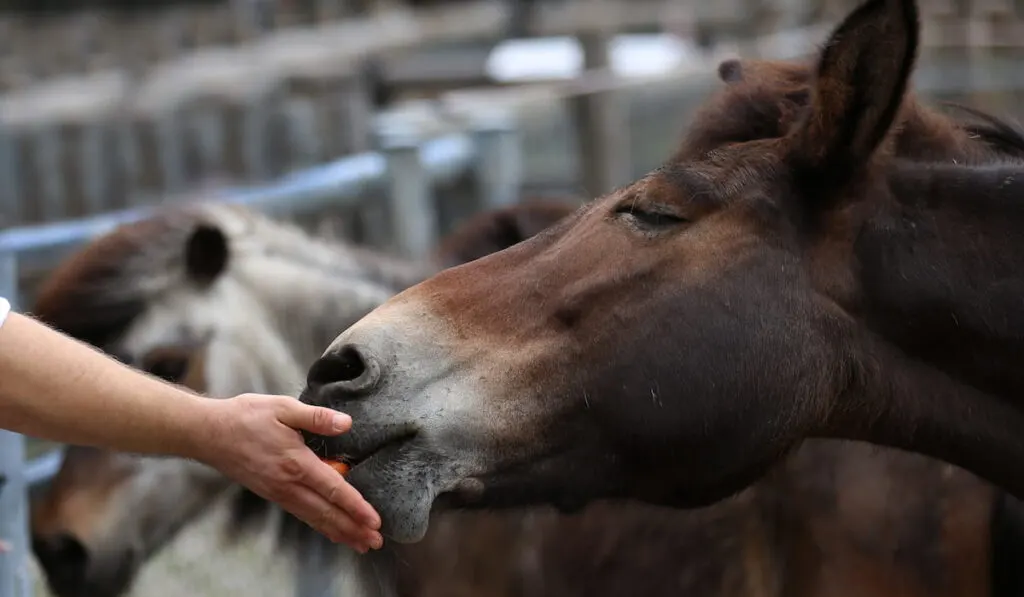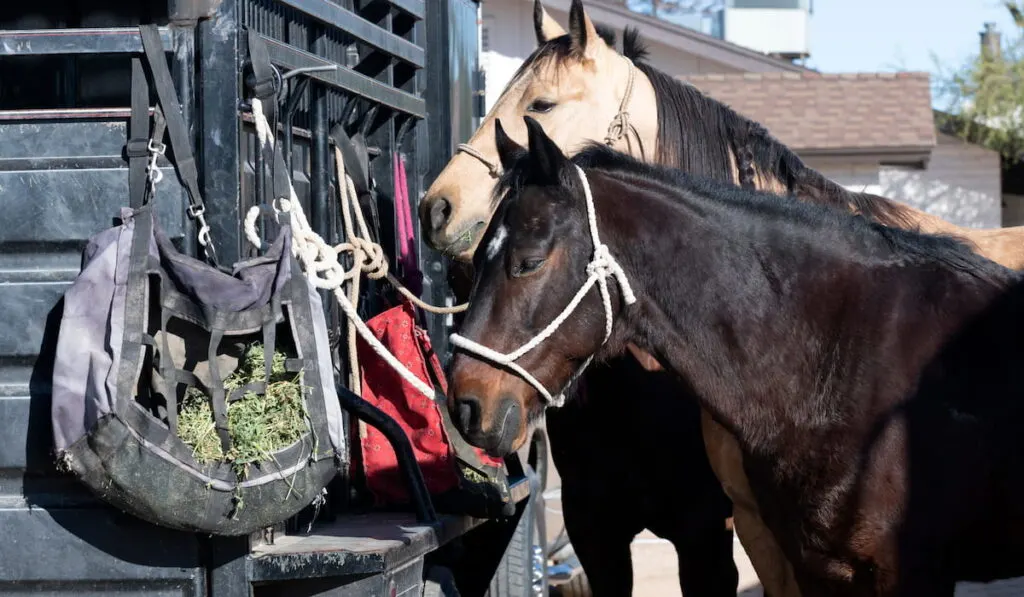Horses can eat oranges whole, including the skin and seeds, and citrus fruits like oranges, tangerines, and clementines are highly nutritious to horses, including Vitamin C and fiber. The sugar content means they should be fed as a treat, in moderation. Always slice oranges to avoid choking, and consider using fresh-squeezed orange juice as a flavoring.
Table of Contents
Key Takeaways
- Oranges are safe for horses to eat, and they’re very nutritious, being a good source of Vitamin C and a great low-calorie horse treat overall (along with apples, carrots, etc.).
- Feed up to one sliced orange per day, along with normal feed. Never feed oranges whole, to prevent choking.
- Fresh-squeezed orange juice used to replace some water in bran-mash is a great way to use orange as a flavoring, or to add electrolytes to the horse’s water. (Source)
- Fresh-squeezed orange juice used to replace some water in bran-mash is a great way to use orange as a flavoring, or to add electrolytes to the horse’s water. (Source)
- Horses can eat other citrus fruits like tangerines and clementines. Horses can eat any type of orange – from Mandarin oranges to blood oranges – and the whole fruit (seeds, peel, etc.) is edible.
- Note that the orange peel, while edible and safe, may include a chemical that will be flagged as a dopant in some horse competitions, according to the FEI. (Source)

Can Horses Eat Oranges?
When it comes to Equine nutrition, the feeding of horses & ponies (as well as mules, donkeys, and other equines,) correct and balanced nutrition is a critical component of proper horse care. Most horses can eat oranges in moderation and oranges are good for them! Oranges are an excellent treat for healthy horses because they contain valuable nutrients and antioxidants.
Remember that, as with all treats, special considerations should be taken before giving oranges to a horse. These “non-ruminant herbivores” are primarily set up to digest plant fibers (cellulose) from grass and hay. So, you don’t want to overwhelm their stomach with a lot of content that isn’t grass and hay.
Treats like oranges are an excellent way to train horses as well as to help create a bond between horses and their owners. Some prepackaged horse treats may contain too many calories or unhealthy ingredients for many horses, making fresh alternatives even better.
What about Blood Oranges? Mandarin Oranges? & Other Citrus Fruits (Tangerines, Clementines, etc.)?
When it comes to feeding horses citrus fruits, variety is key. Blood oranges, Mandarin oranges, and other citrus fruits can be safely included in a horse’s diet, just like regular oranges.
- Blood Oranges: These are distinctive for their deep red color and sweeter taste compared to regular oranges.
- Mandarin Oranges: These are smaller and sweeter, making them an easy and enjoyable treat for horses. Their smaller size makes them convenient for feeding, and they offer a good dose of vitamins.
- Clementines: Similar to mandarins, clementines are small, sweet, and easy for horses to consume. They are an excellent source of vitamin C and are less acidic than some other citrus fruits, making them a particularly horse-friendly option. (Source)
- Tangerines: Tangerines are similar to mandarins and clementines but slightly tangier. They are easy to peel and are a good source of vitamin C and fiber. Their bright taste can be a delightful treat for horses.
- Other Citrus Fruits: Other fruits like grapefruits, lemons, and limes can be offered to horses, but caution is advised. The high acidity and sour taste of these fruits might not be well-received by all horses and could potentially cause digestive issues. Introduce them in small quantities to see how your horse reacts.
What Other Horse Treats Should You Consider For Your Horse’s Diet?
Can horses eat apples & oranges? What about carrots? We’ve looked at a lot of other horse treats on this site, so, here are some other treat ideas with other common fruits & vegetables that are safe and healthy for horses. Below that, you can use our links to related articles to investigate other treats for your horse further:
- Apples are the go-to horse treat for most horse owners. Slice them, and consider mixing it up by adding a green apple from time to time.
- Carrots are another highly nutritious horse treat that can be added by feeding raw after cutting up and washing, or by boiling to make them softer (cool before serving!)
- Strawberries are a safe treat that can be fed in moderation, as they are a hydrating snack rich in vitamins and minerals, but they have high sugar and acidity like oranges and other fruits. But, they’re already bite-sized!
- Rice Krispy treats for horses, made with sweet feed, mini marshmallows, Rice Krispies, and butter, are a quick, no-bake treat that horses love, and can be stored in the refrigerator for later use.
Related Reading on Horse Treats:
- 15 Fruits and Vegetables Horses Love to Eat
- 3 Deliciously Easy DIY Horse Treats
- Horses & Strawberries: Nutrition and Treat Ideas
- Horses & Carrots: Nutrition & Using As A Treat
- Horses & Celery – Why This Vegetable is a Great Treat
- Do Horses Eat Sugar Cubes?
Health Benefits of Oranges For Horses + Feeding Instructions
Oranges contain several health nutrients including vitamin C, a strong antioxidant that helps boost immune systems in people as well as horses! Oranges also contain folate, potassium, and vitamin B as well as fiber.
Oranges are also low in calories and high in water content, both factors making them an ideal healthy horse treat. (source)
For a little more on this, you can watch the video presented at the relevant timestamp below, in which Dr. Kelly Vineyard, a Team Purina Equine Nutrition Expert, discusses the importance of a balanced diet for your horse and how nutrition can fix a lot of things, but not everything:
Are Oranges Safe for Horses to Eat?
Oranges are considered very safe for most horses to eat if you monitor their intake. There are no toxins in oranges that make them dangerous for horses. (source)
Oranges should never be fed as a main meal to horses and should only be given as a treat in small quantities.
Can Horses Eat Orange Peels?
The orange rind, also called the peel, is completely safe for horses to eat! Make sure you wash the orange off before you peel off the rind and feed it to your horse.
There is nothing dangerous in the orange peels for horses, but some of them may not enjoy the bitter taste.

Can Horses Eat Orange Seeds?
Horses can safely eat orange seeds because they do not contain any kind of toxic substance. They are also so small that they do not pose any choking or digestive issues for horses.
Orange seeds contain antioxidants and help to promote energy within the body. (source)
How Many Oranges Can Horses Eat Daily?

Horses should only be fed treats in moderation. Horses should always eat their normal daily meals and fed treats only in between or after meals.
One sliced orange can be safely fed to a horse each day. Feeding too many treats in a single day could cause digestion issues in horses or prevent them from eating their normal food.
How to Prepare an Orange for a Horse
Oranges should be rinsed off before preparing them for your horse. You can then peel the orange to make it easier for horses to chew.
The flesh of the orange can be sliced or separated into sections. You can then feed the orange pieces and the peeling to your horse.
Horse Treat Ideas with Oranges
Frozen Orange Slices
After you rinse and peel an orange, you can separate it into sections, place the pieces into a container, and freeze them. You can feed then feed your horse a few frozen orange slices at a time!
Mix Oranges into Bran Mash

Peeled orange slices can be mixed into bran mash as an added treat.
Bran mash is made by mixing wheat bran and boiling water. Other chopped up fruits and vegetables like apples, carrots, and oats along with oranges can be added.
Can Horses Drink Orange Juice?
Fresh-squeezed orange juice is a great sweet treat for your horse, but it has a very high sugar content. So, the same rules apply as feeding oranges: do so in moderation, only as much orange juice as you’d get from two oranges (if you’re not also feeding sliced oranges).
The point here is to avoid adding a lot of sugar to the horse’s diet, while also offering a sweet/novel treat. Consider using orange juice more as a flavoring – try adding it to the horse’s bran mash, for instance, to replace some water in the recipe and add a unique sweet flavor.
Should Certain Horses Not Eat Oranges?
Horses that suffer from certain metabolic-related diseases should not be fed oranges as treats. Oranges contain around 11.9 grams of sugar and about 12.72 milligrams of potassium. (source)(source)
Horses that suffer from insulin-resistance or hyperkalemic periodic paralysis (HYPP) should steer clear of oranges.
Things to Remember When Feeding Oranges
1. Oranges should only be fed to horses in moderation.
2. Never feed a whole orange to a horse. It should always be sectioned or sliced to prevent choking.
3. Make sure your horse continues to eat its regular food.
4. Consult a vet immediately if your horses begin acting strangely after eating oranges.
5. Do not feed oranges to horses with an insulin-resistant disease or HYPP.
Oranges are a safe and healthy treat for most horses if they are fed in limited quantities and fed in small pieces. Orange peelings, seeds, and flesh are all safe for healthy horses to eat as treats.
They can be fed separately or mixed in with bran mash. Unfortunately, horses with HYPP and insulin resistance should never be fed oranges
Frequently Asked Questions (FAQ)
What Fruits Can Horses Not Eat?
While horses can enjoy a balanced diet that includes various fruits, be aware that not all fruits are edible for them. Commonly, grape seeds and pumpkin parts like the stalk should be avoided due to potential health risks. It is important to consider that some fruits might be edible, but not essential in a horse’s diet. Remember that a treat is just a treat, and it’s still important to take time to ensure your horse is getting the benefits of a healthy diet. (Source)
What Horse Health Conditions Mean I Shouldn’t Feed Oranges?
For horses with specific health conditions, feeding oranges should be approached with caution. Citrus fruits like oranges are fantastic and nutritious, but horses with conditions such as insulin resistance or metabolic syndrome need to have a carefully monitored diet.

